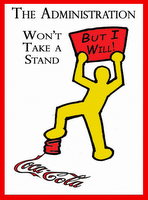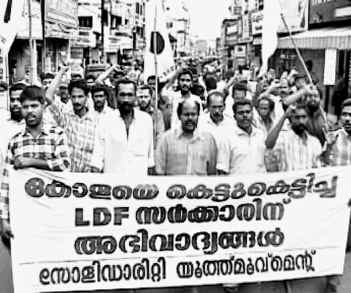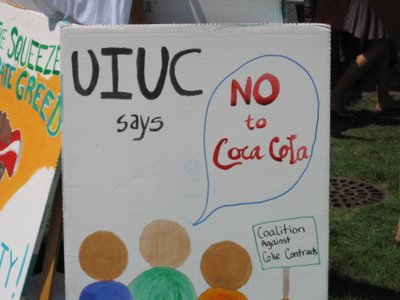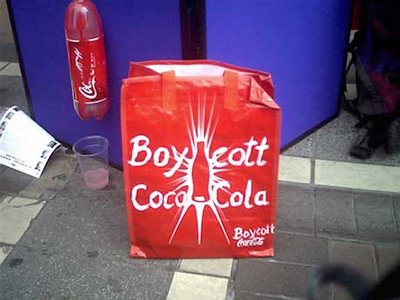Wednesday, August 30, 2006
Thursday, August 24, 2006
Monday, August 21, 2006
First Day of School Action!: Call Office of the Chancellor

On Wednesday [August 23, 2006], please call the office of Chancellor Richard Herman (217-333-6290) to express your concerns about the current exclusive contracts between University of Illinois and Coca-Cola. Most likely, you will be asked to leave a message. The following short-text might help:
•Introduce yourself as student/staff/faculty/community member.
•" I am calling to express my concerns over university's exclusive beverage contracts with Coca-Cola. Coke is responsible for a number of human rights and labor violations, and environmental degradation. University of Illinois should NOT do business with a corporation that puts profits over human rights. Please DO NOT renew the contract with Coca-Cola"
Please email us at[cokeactiongroup@riseup.net] after you make a call.
Thank you for your support!
Talking Points
1.Why do we want Coke off campus?
•Murders and Human Rights Abuses in Colombia: Since 1989, 8 union leaders from Coca-Cola bottling plants have been murdered by paramilitary forces in association with Coke plant managers. Dozens of other workers have been intimidated, kidnapped or tortured. There is clear evidence that managers of several plants have ordered assaults to occur and made regular payments to leaders of the paramilitary groups. Union-busting has greatly benefited Coke and increased their profits. A court case filed in 2001 in Miami against Coca-Cola regarding these issues remains unsettled while investigations by Hiram Monserrate (2004) and Lesley Gil (2004) prove allegations are legitimate.
•Environmental Devastation in India: A pattern of abuse has emerged for Coca-Cola's bottling operations in India. Coca-Cola is guilty of:
1.Polluting ground water and soil around its bottling facilities
2.Distributing its toxic waste as "fertilizer" to farmers. The waste contains dangerous concentrations of cadmium and lead.
3.Selling drinks with high levels of pesticides —sometimes 30 times higher than EU standards.
4. Extracting millions of litres of ground water and causing severe water shortages in various parts of India
In a recent independent investigation the Center for Science and Environment (CSE) found dangerous levels of pesticide in all brands of Coke manufactured in India.
•Union Busting and Beatings in Turkey and Indonesia: Upon attempting to unionize, the workers in Coca-Cola bottling plants in Indonesia and Turkey were fired en masse
2. The contract is up for renewal in 2007, what is the purpose of calling this early?
It is never too soon to decide NOT to renew the contract. The University should make the decision of non-renewal of contract with Coca-Cola as soon as possible and explore other options of beverage contracts.
3. Isn't this a matter of courts/independent investigation?
The recent investigation conducted by Center for Science and Environment (CSE) is independent and on the grounds of their report, the Government of India is considering total ban on Coca-Cola altogether. Seven states in India have already banned Coke. Several campuses in the United States have decided not to do business with Coca-Cola because of the company’s egregious records.
In the past, universities have never waited for a court decision to express their concern about the practices of their business partners or licensees. University codes of conduct grant them the authority to evaluate their licensees' compliance.
Read more!
Posted by
Coalition Against Coke Contracts
at
8/21/2006 10:17:00 AM
![]()
Saturday, August 19, 2006
Coca-Cola banned at British university
SUSSEX, England, Aug. 19 (UPI) -- Britain's University of Sussex has
banned all Coca-Cola products from its student union to protest the
company's alleged business practices.
Other British campuses are expected to follow suit amid calls for a
nationwide student boycott against the soft drink giant, the
Independent reported Saturday.
U.K. Students Against Coca-Cola has been pressuring the purchasing
consortium that provides food and drink to British campuses to cancel
its four multimillion-dollar contracts with Coke, the newspaper said.
For complete story, click here
Read more!
Posted by
Coalition Against Coke Contracts
at
8/19/2006 11:18:00 AM
![]()
Wednesday, August 09, 2006
Jubilation in Plachimada!

From: The Hindu, August 10, 2006
PALAKKAD: There is jubilation in Plachimada and Kanjikode in Palakkad district over the decision of the State Government to ban the production and sale of Coca-Cola and Pepsi Cola after the soft drinks have been ``found injurious to health.''
The two places have been in the news for quite some time in the wake of agitations by local people demanding the closure of the plants of the soft drink majors there.
The Democratic Youth Federation of India (DYFI) took out a march to the Coca-Cola unit at Plachimada on Wednesday hailing the decision.
The Solidarity Youth Movement took out a march through the streets of Palakkad and held a public meeting at the town bus stand. Leaders of the Plachimada Solidarity Committee spoke at the meeting.
Read the complete report Here
Read more!
Posted by
Coalition Against Coke Contracts
at
8/09/2006 11:59:00 PM
![]()
Kerala Throws Out Coca-Cola and Pepsi

Seven Other States Impose Ban, Others Expected to Follow
For Immediate Release
August 9, 2006
Trivandrum, India (August 9, 2006): The state government of Kerala in south India has banned the production and sale of Coca-Cola and Pepsi in the state. The companies will be asked to close their operations entirely.
Chief Minister V. S. Achuthanandan stated today that the ban was being imposed because of the health hazards posed by Coca-Cola and Pepsi.
"We have arrived at the decision to ask both Coke and Pepsi to stop production and distribution of all their products, based on scientific studies which have proved that they are harmful," said Mr. Chief Minister V. S. Achuthanandan.
Chief Minister Achuthanandan also pointed to the four year campaign by the community of Plachimada in Kerala where the community has protested falling water levels and pollution of the groundwater and soil - directly as a result of the Coca-Cola company's bottling operations in the area.
Read the complete report here:
Read more!
Posted by
Coalition Against Coke Contracts
at
8/09/2006 12:57:00 PM
![]()
Sunday, August 06, 2006
Coca-Cola busted in India

In a comprehensive study covering 12 states, Centre for Science and Environment (CSE) has found dangerous levels of pesticides in all samples of soft drinks. For more information, visit http://www.cseindia.org/misc/cola-indepth/cola2006/cola-index.htm
Read more!
Posted by
Coalition Against Coke Contracts
at
8/06/2006 01:36:00 PM
![]()
Thursday, August 03, 2006
August 3 protests in Mehandiganj, India
Posted by
Coalition Against Coke Contracts
at
8/03/2006 03:14:00 PM
![]()
Dangerous Pesticides in Coca-Cola and Pepsi in India
For Immediate Release
August 3, 2006
San Francisco (August 3, 2006): Coca-Cola and Pepsico carbonated drinks in India contain dangerously high levels of pesticides, according to a new study released yesterday by the Centre for Science and Environment (CSE), a leading public interest research and advocacy group in India.
CSE tested 57 samples of Coca-Cola and PepsiCo carbonated products from 25 different bottling plants across 12 states and found pesticide residues in all samples.
The study found a "cocktail of between three to five different pesticides in all samples" - and on an average, the pesticide residues were 24 times higher than European Union (EU) standards and those proposed by the Bureau of India Standards (BIS), the government body responsible for standardization and quality control.
The study found high levels of:
* Lindane - a confirmed carcinogen - sometimes as high as 140 times those allowed by EU and BIS standards
* Chlorpyrifos - a neurotoxin - sometimes as high as 200 times those allowed by EU and BIS standards
* Heptachlor - which is banned in India and also has not been used in the US since 1988 - was found in 71 per cent of the samples, at levels 4 times higher than the proposed BIS standards.
* Malathion - a pesticide that the US EPA recommends that workers wait at least 12 hours before entering the area of application - were found in 38.6% of the samples tested.
"This is a grave public health scandal," said Sunita Narain, director of the Centre for Science and Environment and winner of the prestigious 2005 Stockholm Water Prize.
The latest study comes three years after CSE had found similar levels of pesticides in Coca-Cola and Pepsico products. One of the highest ranking bodies possible to be set up in India, the Joint Parliamentary Committee (JPC), was convened to look into the issue of dangerous levels of pesticides in soft drinks. In February 2004, the JPC confirmed the unsafe levels of pesticides in soft drinks, and recommended that the government set standards for these residues in the products. Since then, a committee from the Bureau of Indian Standards (BIS) has convened over 20 meetings to deliberate on the standards, and Coca-Cola, Pepsico, consumer and environmental organizations have all been consulted.
In October 2005, the standards were finalized by the committee, and in March 2006, the committee met again to reconfirm the standards. The BIS has adopted the same standards as the European Union - which stipulates a single residue limit of 0.0001 parts per million and multiple residue limit of 0.0005 parts per million. The proposed standards, however, have been delayed from being implemented, ostensibly to do more research.
The Centre for Science and Environment sees it differently. "Our reason is simple: if soft drinks contain a cocktail of pesticides above stipulated standard, they are unsafe. The companies say there are no stipulated standards. The reason is simple: they don't allow standards to be formulated. The standards that needed to be set to regulate their safety have been lost in committees or blocked by powerful interests in the government. The soft drink companies and their industry associations had fought tooth and nail against setting up a final product standard," said CSE in a prepared statement.
The Centre for Science and Environment is demanding that the government implement the standards immediately and make the standards mandatory for the soft drink companies.
Coca-Cola and Pepsico together control about 90% of the carbonated beverage market in India.
The Coca-Cola company is also the target of community campaigns across India accusing the company of creating severe water shortages and pollution around its bottling plants. A number of studies, including those by the government of India, have confirmed the growing water shortages and pollution of groundwater and soil by the Coca-Cola company. One of Coca-Cola's largest bottling plants in India, in Plachimada in Kerala, has remained shut down since March 2004 because of community opposition and government action.
There is also a growing campaign internationally that is applying pressure on the Coca-Cola company to end its abuses in India. More than ten colleges and universities in the US and UK have taken action against the Coca-Cola company. The company was also recently ejected from the US$ 8 billion TIAA-CREF Social Choice Account because of the international campaign. TIAA-CREF is one of the largest financial services companies in the United States, with over US$ 380 billion in assets.
"This is a classic case of double standards by a large multinational company in India. They are selling sub-standard products in India that could never be sold in Europe," said Amit Srivastava if the India Resource Center, an international campaigning organization. "It is Coca-Cola and Pepsico's responsibility to deliver a safe product in India, and they have failed to do so even after being informed that their products were toxic three years ago."
The report by the Centre for Science and Environment can be seen at www.cseindia.org
For more information on the campaign to hold Coca-Cola accountable, visit www.IndiaResource.org
Read more!
Posted by
Coalition Against Coke Contracts
at
8/03/2006 01:19:00 PM
![]()





